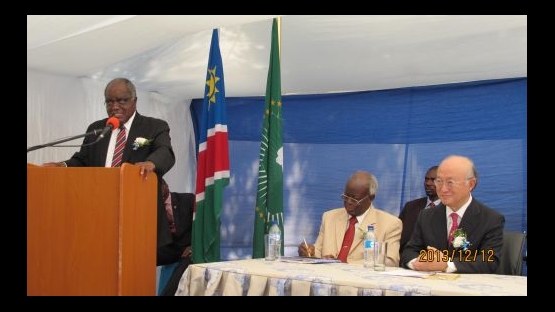A new Nuclear Medicine Department has been inaugurated at Oshakati Intermediate Hospital, northern Namibia, on 12 December 2013. The Department is only the second facility in Namibia that will provide diagnostic and treatment services in the areas of endocrinology, cardiology and oncology. Prior to the opening of the new Department, the country's only public nuclear medicine department was located at the Windhoek, at the Bernard May Hospital, some 800km away from Oshakati. The new Nuclear Medicine Department offers its patients possibilities that were formerly inaccessible or unaffordable for most people. For example, the treatment of thyroid cancer is now available at Oshakati.
The inauguration ceremony at the Oshakati Intermediate Hospital was attended by the President of Namibia, H.E Hifikepunye Pohamba, the Director General of the IAEA, Mr Yukiya Amano, and by Namibia's Minister of Health and Social Services, Dr. Richard Nchabi Kamwi.
In his speech, President Pohamba stressed that the new centre will greatly contribute to the overall health of the Namibian people, and highlighted the IAEA's contribution towards the establishment of the new facility.
The IAEA has been working with Namibia in the area of human health through a number of technical cooperation (TC) projects for almost twenty years. The IAEA played an important role in helping Namibia establish its first radiotherapy centre and nuclear medicine department by providing assistance under its TC programme through the provision of long-term training and education for health professionals, expertise in setting up the centres and the procurement of equipment.
Through its TC programme, the IAEA has also been helping Namibia to use nuclear science and technology to achieve its national development goals. Apart from human health, the IAEA has worked with Namibia in the areas of food and agriculture, water, environmental monitoring, safeguarding the uranium industry, marine environment and coastal zone management and radiation safety.
President Pohamba noted the importance of nuclear technology in these areas, and expressed the need for strengthened collaboration between Namibia and the IAEA to build further national capabilities to deploy nuclear techniques for development, especially for food security and safety.


